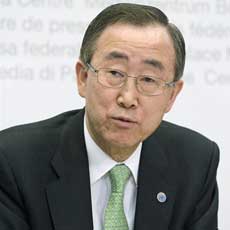ROUNDUP: Billionaires, politicians join forces against global woes
 New York - Major charity foundations, government leaders and politicians of all stripes joined forces on Thursday to push for progress in ending poverty, hunger and fighting diseases, and warned that a massive financial crisis could not detract from those efforts.
New York - Major charity foundations, government leaders and politicians of all stripes joined forces on Thursday to push for progress in ending poverty, hunger and fighting diseases, and warned that a massive financial crisis could not detract from those efforts.
UN Secretary General Ban Ki-moon launched the one-day session to review progress on the Millennium Development Goals (MDGs), a series of ambitious UN targets on slashing extreme poverty, improving health and education across the developing world.
Ban warned that a financial crisis sweeping across advanced economies would actually have its greatest effect on the poor. The financial turmoil besieging many countries, including the largest UN donors like the United States, was only adding to food and energy crises already affecting developing countries.
"The current financial crisis threatens the well-being of billions of people, none more so than the poorest of the poor," Ban told the UN General Assembly. "This only compounds the damage being caused by much higher prices for food and fuel."
"We must rise to all of these challenges immediately," he exhorted the nearly 80 world leaders attending meetings at UN headquarters in New York.
Ban called on governments to be "bold" and "generous" in their commitments to achieve the MDGs, which were launched in 2000 and have a target date of 2015.
British Prime Minister Gordon Brown said he expected some 8 billion dollars in new development initiatives by the end of the day. One of those was a more than
3-billion-dollar plan unveiled to eradicate malaria by 2015.
Bill Gates and his wife, who run the Bill and Melinda Gates Foundation, and Howard G Buffett, son of billionaire Warren Buffett, whose foundations provide hundreds of millions of dollars to global programmes fighting poverty and diseases, were present at the UN meetings to answer the calls for generosity.
Gates said the MDGs, for all their shortcomings, had been crucial in "raising the visibility of the suffering faced by the world's poorest people" and said he was encouraged by some of the innovative ideas coming out of the process.
The billionaires offered initial funding of 76 million dollars to the World Food Programme for seeds and assistance to farmers over the next five years. The scheme hopes to help a total of 350,000 farmers in 21 developing countries by the end of that period and feed hundreds of thousands of people. Gates also pledged 168.7 million dollars for malaria.
Chinese Prime Minister Wen Jiabao said development should be the top priority of all governments. He announced new debt-forgiveness plans and pledged 30 million dollars and 1,000 experts to help poorer countries grow their own food.
Brown warned that the hungry are dying while the UN continued its debate on programmes.
"Facing betrayal of the MDGs, we say again we will come, but many continue to die while we wait," Brown said. "And I believe our greatest enemy is not war or inequality or any single ideology or a financial crisis; it is too much indifference."
Despite some progress being made on education and combatting diseases like AIDS and malaria, Brown warned that many aid efforts were still falling flat.
There are still 75 million of the world's children not attending school, and the goal of providing education to every child will not be met on present trends in 2015 or 2025 or even in 2100, Brown said.
"I say to the richest countries of the world: the poorest of the world have been patient, but a hundred years is too long to wait for justice," he said.
Norwegian Prime Minister Jens Stoltenberg, who launched a progress report on the global health campaign, said he had "hardly seen any progress at all" on cutting maternal mortality rates, despite global efforts involving various governments and organizations.
In order to save 3 million mothers and 7 million newborns from death, each would require an additional 2.4 billion dollars in 2009, and rising to 7 billion dollars in 2015, the report said.
The report called for mobilizing international support for stronger health systems, including the training and recruitment of over 1 million health workers.
Stoltenberg, Brown, the World Bank and World Health Organization announced a new taskforce that would look at new methods of financing health programmes. (dpa)